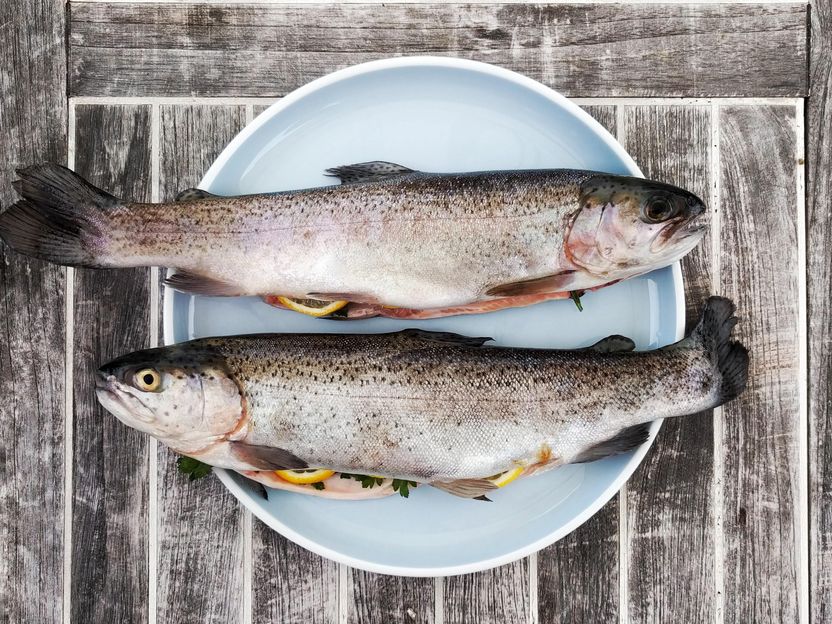Invisible danger: Listeria in smoked fish
Risk groups should avoid certain foods
Advertisement
fish should be a regular part of the diet. It is an important source of biologically valuable and easily digestible protein, minerals and vitamins. However, raw, smoked and pickled fishery products also often contain pathogenic germs, in particular listeria. Humans can become infected and suffer from listeriosis through consumption of contaminated food. In 2018, 701 cases of severe invasive listeriosis were reported to the Robert Koch Institute (RKI), the equivalent of 0.8 cases per 100,000 inhabitants. Most of the reported listeriosis diseases are severe and are associated with blood poisoning, meningitis or miscarriages. In 5 % of cases, the disease was fatal in 2018. The elderly, people with weakened immune systems, pregnant women and their newborns are particularly at risk. Listeria can occur in a wide variety of foods of plant and animal origin. Cold or hot-smoked fish are often contaminated and are therefore also suspected of transmitting this disease. Other fishery products and seafood eaten raw, such as sushi, sashimi and oysters, or pickled products such as gravad fish, may also be affected. "Pregnant women, elderly people or those with weakened immune defences should only eat fish and seafood when thoroughly heated," says Professor Dr. Dr. Andreas Hensel, President of BfR.

Photo by Gregor Moser on Unsplash
Not all Listeria cause disease. Of the 20 Listeria species described, only Listeria (L.) monocytogenes is relevant as a cause of infection in humans. Infections during pregnancy can lead to miscarriage, premature birth, stillbirth or the birth of a sick child. In addition, listeriosis occurs mainly in people whose immune system is weakened by old age, previous illnesses or medication. They often suffer from blood poisoning, inflammation of the brain or meninges as well as, for example, inflammation of the inner lining of the heart or bacterial inflammation of the joints. Listeriosis is associated with a comparatively high mortality rate in risk groups. In healthy people who do not belong to one of the risk groups, an infection can lead to a feverish gastrointestinal inflammation, which is usually mild.
The bacterium L. monocytogenes is widespread in the environment and can occur in many foods. High detection rates are found, for example, in minced meat, raw meat preparations (e.g. tartar), raw sausages (e.g. onion-met sausage) and raw milk. But also numerous other ready-to-eat foods of animal and plant origin which are not subjected to a further germicidal treatment (e.g. by heating) after processing may contain L. monocytogenes. These include, for example, cheese (made from raw or pasteurised milk), pre-cut salads and vegetables, delicatessen salads or cut sausage products. This is due to the fact that Listeria can survive for a long time in food processing establishments in niches that are difficult to reach for cleaning and disinfection. This can lead to continuous entry of the germs during the production of food.
Raw, smoked or pickled fishery products and seafood such as sushi, sashimi, oysters, cold or hot smoked fish (e.g. smoked salmon) and pickled fish (e.g. gravad salmon) are often contaminated with Listeria. 7 to 18 % of the samples of cold-smoked or pickled fishery products examined by the official food control authorities in Germany in the years 2007 to 2017 and 3 to 9 % of the samples of hot-smoked fishery products contained L. monocytogenes. Even low levels of micro-organisms pose a risk to risk groups, for example when products are stored at home above the temperatures recommended by the manufacturer or when they are eaten after the expiry date. Handling contaminated products also carries the risk of listeria being transferred to other foods.
The German Society for Nutrition (DGE) recommends at least one sea fish meal a week. Above all, fish contains special fatty acids, the long-chain omega-3 fatty acids docosahexaenoic acid (DHA) and eicosapentaenoic acid (EPA).
The BfR recommends that people who have an increased risk of developing listeriosis should not avoid fish as a matter of principle, but only eat fish or seafood that is well heated. Listeria can be reliably killed by heating the food to 70 °C in its core for at least 2 minutes. However, risk groups should refrain from eating raw, smoked and pickled fishery products and sea animals.
Note: This article has been translated using a computer system without human intervention. LUMITOS offers these automatic translations to present a wider range of current news. Since this article has been translated with automatic translation, it is possible that it contains errors in vocabulary, syntax or grammar. The original article in German can be found here.


























































